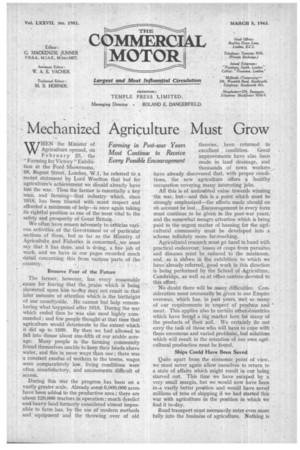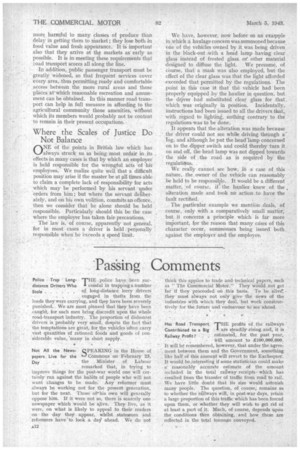Mechanized Agriculture Must Grow
Page 13

Page 14

If you've noticed an error in this article please click here to report it so we can fix it.
Farming in Post-war Years Must Continue to Receive Every Possible Encouragement
WHEN the Minister of Agriculture opened, on YV February 25, the "Farming for Victory" Exhibition at the Ford Showrooms, 88, Regent Street, London, W.1, he referred to a recent statement by Lord Woolton that but for agriculture's achievement we sliould already have lost the war. Thus the farmer is essentially a key man, and farming—that industry which, since 1918, has been treated with scant respect and afforded a minimum of help—is once again taking its rightful position as one of the most vital to the safety and prosperity of Great Britana. We often have reason adversely to criticize various activities of the Government or of particular sections of them, but so far as the Ministry of Agricultu're and Fisheries is concerned, we must say that it has done, and is doing, a fine job of W.ork, and we have in our pages recorded much detail concerning this from various 'parts of the country, Remove Fear of the Future The farmer, however, has every reasonable -cause for fearing that the., praise which is being showered upon him to-dUy may not result in that later measure of attention which is the birthright of our countryside. He cannot but help remembering what happened after 1918. During the war which ended then he was also most highly commended; and few people thought at that time that agriculture would deteriorate to the extent. which it did up to 1939. By then we had allowed to fall into disuse about one-fifth of our arable acreage. Many people in the farming community found themselves unable to keep their heads above water, and this in more ways than one ; there was a constant exodus of workers to the towns, wages were comparatively low, living conditions were often unsatisfactory, and amusements difficult of 'access.
During this war the progress has been on a vastly greater scale. Already some 6,000,000 acres have been added to the productive area ; there are about 120,000 tractors in operation; much derelict and heavy land formerly considered almost impossible to farm has, by the use of modern methods and equipment and the throwing over of old theories, been returned to excellent condition. Great improvements have also been made in land drainage, and thousands of town workers, have already discovered that, with proper conditions, the new agriculture offers a healthy occupation .covering many interesting' jobs. All this is of undoubted value towards winning 'the war, but—and this is a point which must be strongly emphasized—the efforts made should on nb account be lost. . Encouragement in every form must continue ,to be given in the post-war years,and the somewhat meagre attention which is being paid to the urgent matter of housing for the agricultural community must be developed into a scheme infinitely more far-reaching.
Agricultural research must go hand in hand with practical endeavour, losses of crops from parasites and diseases must be reduced to the minimum, and, as is shOwn in the exhibition to which we have already referred, good work in this direction is being performed by the School of Agriculture. Cambridge, as well as at other. centresdevoted to this effort.
No doubt there will he many difficulties. Consideration must necessarily be given to our Empire overseas, which has, in past years, met so many of our requirements in respect of produce and meat. This applies also to certain other countries which have fourid a big market here for many of the products of their soil. We certainly do not envy the task of those who will have to cope with these enormous and varied problems, but solutions which will result in the retention of our own agricultural production must be found.
Ships Could Have Been Saved Quite apart from the economic point of view, we must never again allow ourselves to return to a state of affairs which might result in our being starved out. This time we have escaped by a very small margin, but we would now have been in-a vastly better position and would have saved millions of tons of shipping if we had started this war with agriculture in the position in which we find it to-day.
Road transport must necessarily enter even more fully into the business of agriculture. Nothing is more harmful to many classes of produce than delay in getting them to Market; they lose both in, food value and fresh appearance. It is important also that they arrive at the markets as early as possible. It is in meeting these requirements that road transport scores all along the line.
In addition, .public passenger transport must be greatly 'widened, so that frequent services cover every area, thus permitting ready and comfortable .access between the more rural _areas and those places at'which reasonable recreation and amusement can be obtained. In this manner road transport can help in full measure in affording to the agricultural community those amenities, without which its members would probably not be content • to remain in their present occupations. .
Where the Scales of Justice Do Not Balance . •
OnNE of the points in British law which has struck us as being most unfair in its effects in many cases is that by which an employer is held responsible for the wrongful acts of his employees. We realize quite well that a difficult position may arise if the master be at all times able to claim a complete lack of responsibility for acts which may be performed by his servant tinder orders from 'him ; but where the servant deliberately, and on his own volition, commits an offence, then we consider that he alone should be held responsible. Particularly should this be the case where the employer has taken fair. precautions.
The law is, of course, apparently not general, for in most cases a driver is held . personally responsible When he 'exceeds a speed limit. We have, however, now before us an exatpple in . which a haulage concern was summoned because one of the vehicles owned by it was being driven in the black-out -with a head lamp having clear • glass instead of frosted glass. of other material designed to diffuse the light. We presume, of churse, that a mask was also employed, but the effect of the clear glass was that the light afforded • .exceeded that permitted by the regulations, The point in this case i that the vehicle had been properly equipped _by the haulier in question, but the driver had substituted clear glass • for that. which was originally in position. Incidentally, instructions had been issued to all the drivers that, with regard to lighting, nothing contrary to the regulations-was to be done.
It appears that the .alteration was made because • the driver could not see while driving through a" Tog, and although he put the headlamp concerned on to the. dipper. switch and could thereby turn it on and off, the head lamp was not dipped towards the side of the road as is required . by the regulatiems.
We really cannot see how, _iii .a case of this nature, the_, owner of the vehicle can reasonably, be held to be responsibl.e. It would he a different . matter, 'of course, if1/4 the haulier knew of the , alteration made and took no action to have the fault rectified.
. The particular example we mention ,deals, of course, only with a comparatively small matter; • but it concerns a principle which is far more inniortant, for the reason that many cases of this character occur, summonses being issued both, against the employer and the employee.




















































